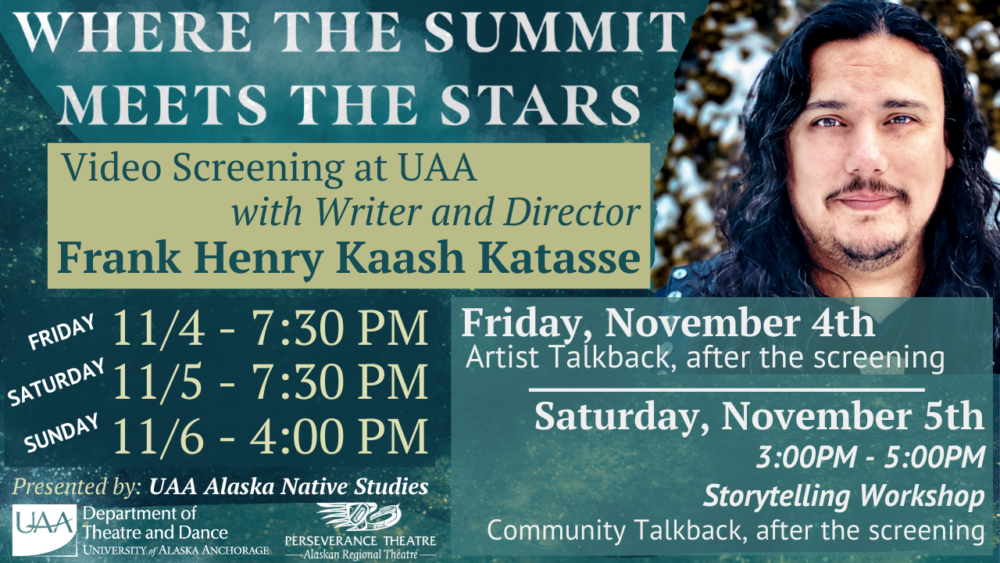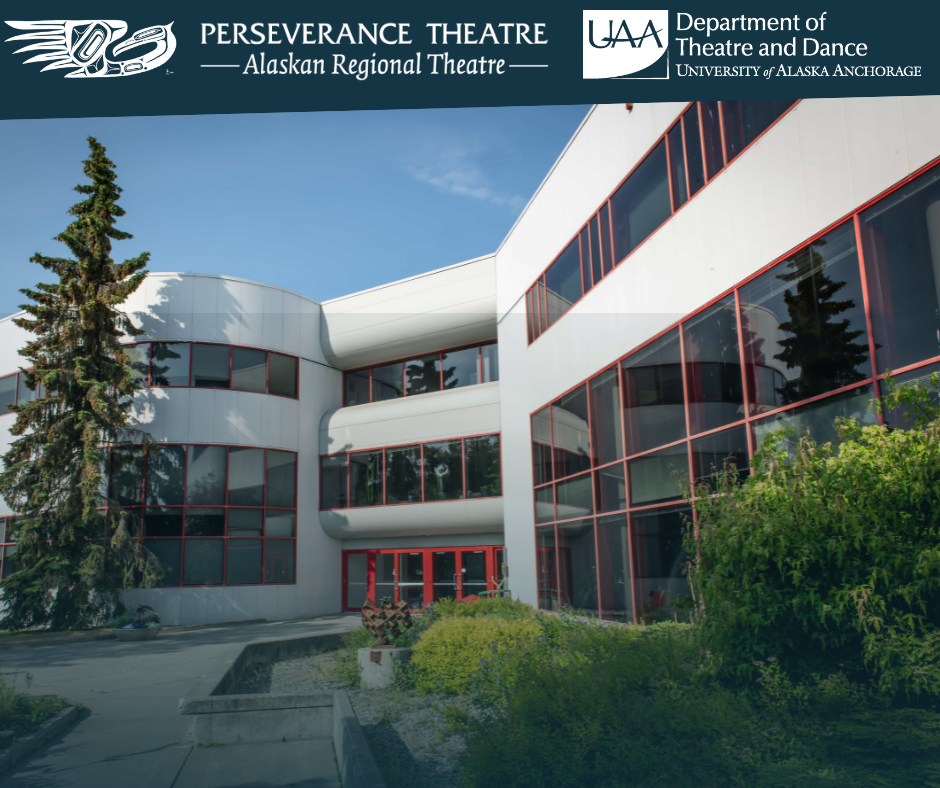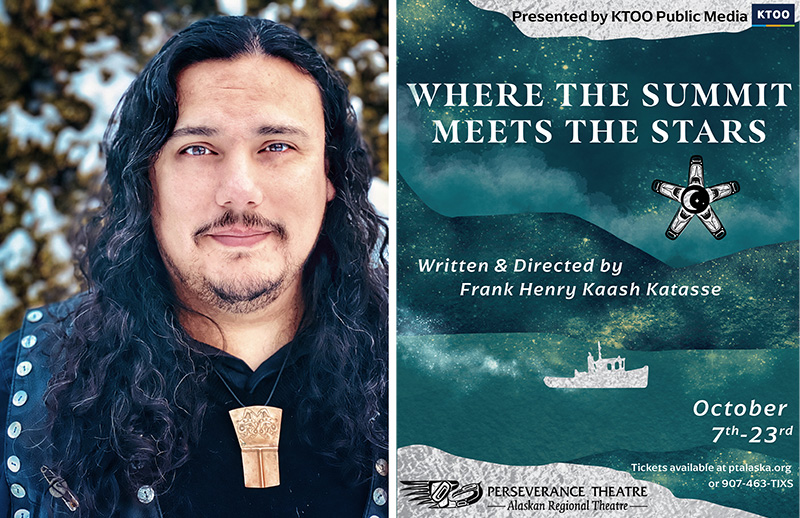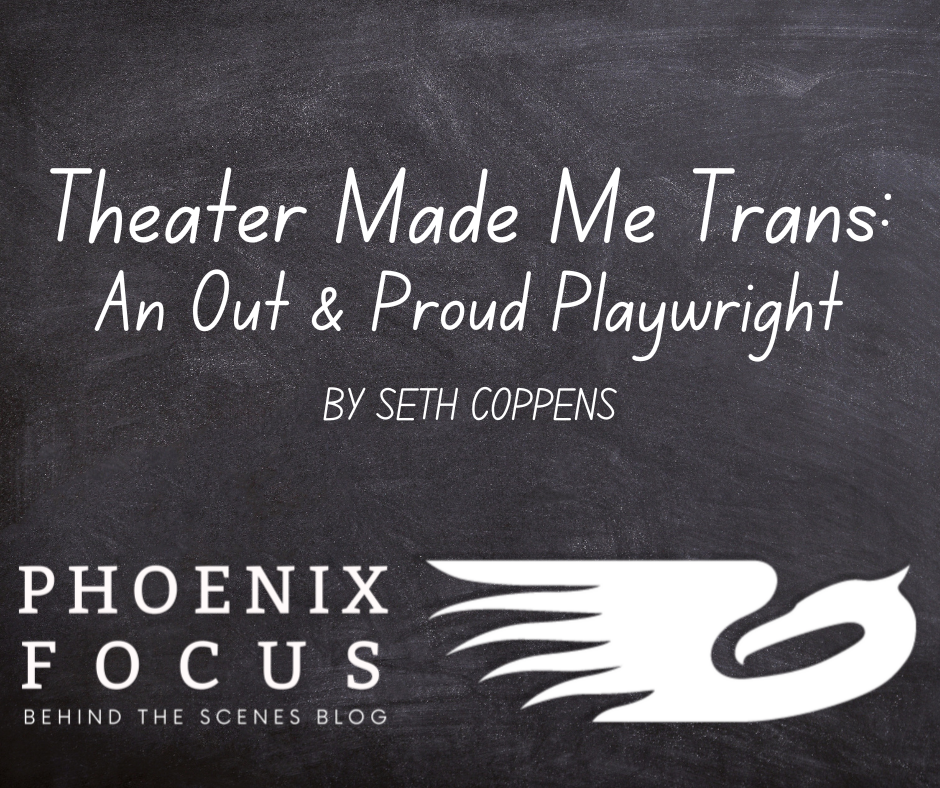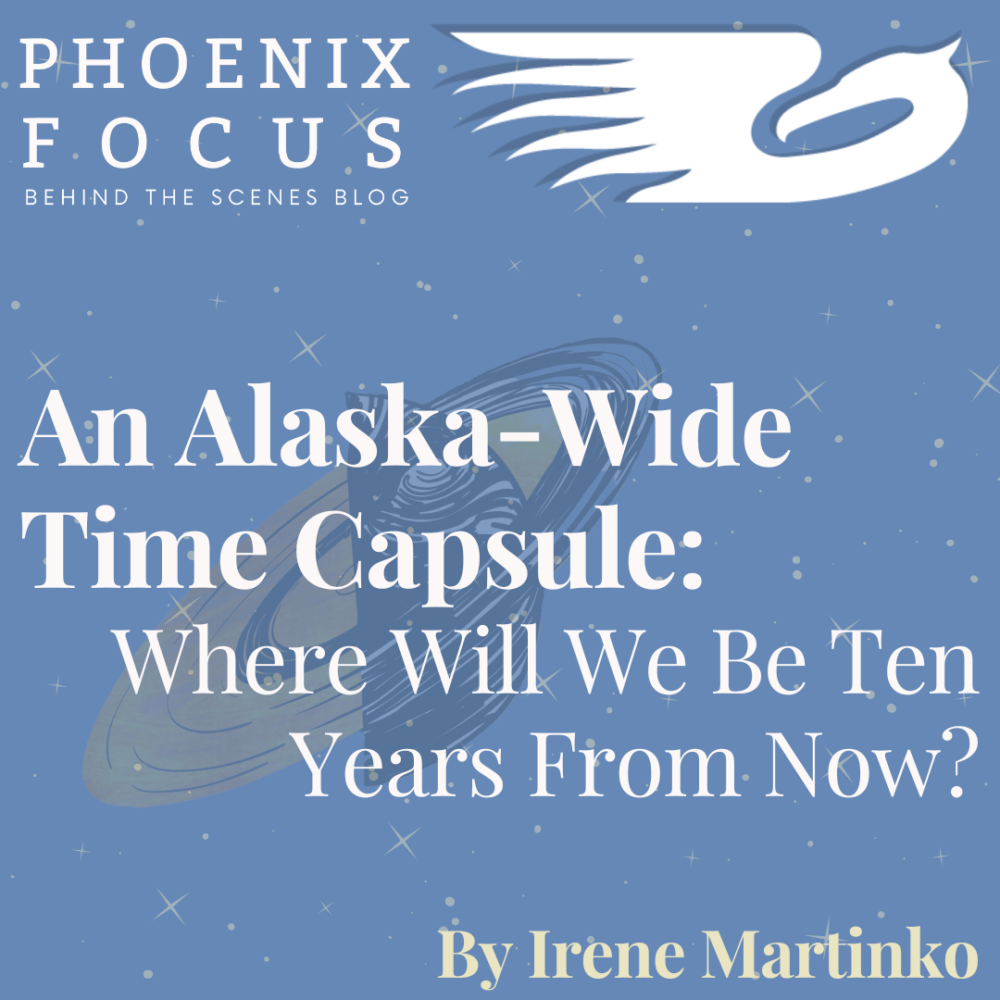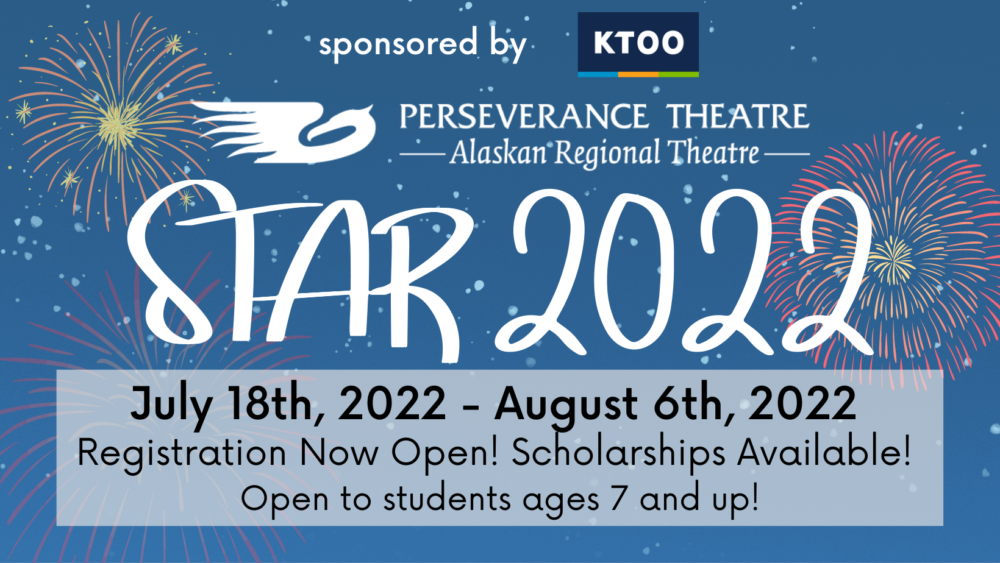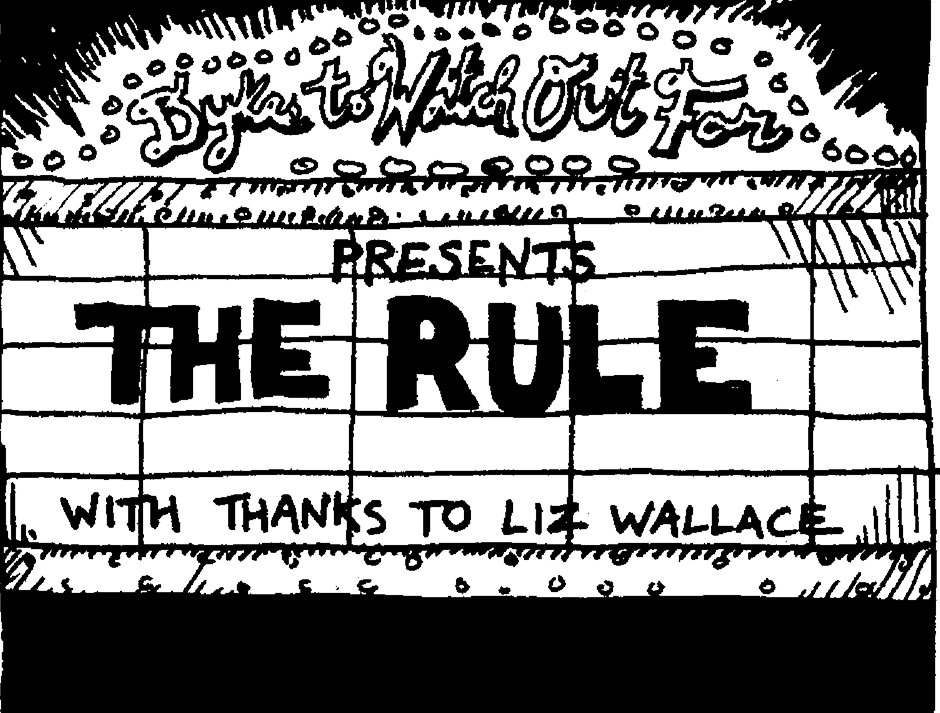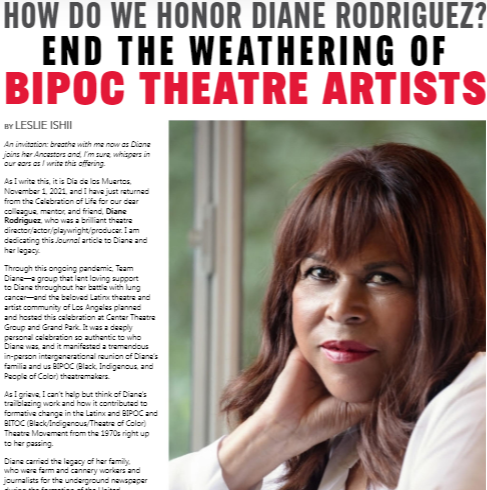Playwright, author, screenwriter, actor, educator, director… Tlingit theatre artist Frank Henry Kaash Katasse is certainly a multi-talented guy! And in just over a month, his brand new play Where the Summit Meets the Stars will receive its world premiere production on the Perseverance Theatre mainstage.
Okay, that’s your cue to get really excited. Seriously! This is a good one. Here’s a little sneak peek:
Where the Summit Meets the Stars is an ethereal Alaska Native story driven by music, dance, and the culture of the Tlingit people. When a near-death experience derails her flight through Southeast Alaska, Rose awakens to find herself in the care of the kind man who pulled her to safety. But who is this mysterious stranger? And how is it possible that she survived? As they journey by boat through the darkness and fog, Rose untangles the mysteries of her past, questions the world around her, and comes to an inescapable crossroads.
I mean, if you weren’t already pumped before, you’re definitely hooked now, right? In my own excitement, I decided to hop on the phone with Frank to learn more about this upcoming production, his work as a writer, and how Where the Summit Meets the Stars came to be.
I asked him to go back to the very beginning and answer this question: How did you become a playwright?
“Initially I wrote a monologue because I was wanting one to audition with, and I was having a hard time finding a Native monologue that I could use,” Frank explained. “I wanted to Indigenize my audition, and I was looking frantically for a monologue and I just could not find one!”
So in order to support himself as an actor, he sat down after work one day and wrote a monologue that was just a few minutes long. But what he found was that not only was he able to write pieces that spoke to him personally, but that he really enjoyed the actual process of writing. He was inspired by the things he saw around him, and that led to a new habit of writing on a more regular basis. And his monologues and poetry began to form something bigger.
“It all kind of came together and I realized I could make it a play,” continued Katasse. “And that became They Don’t Talk Back.”
But at first, it was difficult to get the full-length play They Don’t Talk Back off the ground.
“No one read it,” said Frank. “Not their fault! I get stuff and I don’t read it sometimes. So I thought, ‘Maybe it’s not that great’, and I kind of sat on it for a long time.”
But when Frank was introduced to Jean Bruce Scott, the founder and Producing Executive Director of Native Voices at the Autry, she learned that he was an emerging playwright and encouraged him to submit his work to a Native Voices full-length play competition. His play was a hit, and They Don’t Talk Back would eventually go on to be produced by Native Voices and La Jolla Playhouse, and by Perseverance Theatre. After that success, he continued to write, dabbling in plays, television scripts, books, short stories, and more.
“I still have major impostor syndrome, because I never studied how to do this,” said Frank. “But acting in plays for years beforehand gave me an idea of the style and tone of plays that I like to read and do. I was trying to use as much of that as I could.”
And he has certainly been able to embrace his own interests, style, poetry, and humor in his work, exploring themes and stories that resonate with him and with his culture.
“I like to tell contemporary Indigenous stories. I purposely try to timestamp all of them so I can try to fit them into different decades over the past forty years,” elaborated Katasse. “Going to school in Hawaii, I loved the idea of local theatre and Indigenous Hawaiian theatre and I thought, ‘This is something that’s needed in Southeast Alaska for my Tlingit culture!’ I want to do plays showing contemporary Indigenous stories. This is us right now. I’m trying to change the idea that a lot of Indigenous stories are in the past.”
With They Don’t Talk Back, The Spirit of the Valley, his work as a writer for the PBS Kids show Molly of Denali, and now Where the Summit Meets the Stars, Frank is certainly succeeding in bringing contemporary Alaska Native characters and stories to the stage and screen. And he purposely creates characters that he knows anyone in the audience can relate to.
“It’s like you’re playing darts and you’re throwing darts at a dartboard,” Frank explained. “Everyone can throw a dart at that board and find something they relate to in that play. People who are Indigenous are going to get closer to the bullseye. The random dude from San Diego is going to throw it and hit an outside ring because he knew the characters and knew the story. Making universal characters that people can relate to was really eye-opening. We’re all human beings and we’re all connected to each other!”
And this brings me back to Where the Summit Meets the Stars, a story set in Southeast Alaska featuring modern-day Tlingit characters facing very real and relevant challenges. Perseverance has been hoping to bring this piece to the mainstage for a long time, and if not for the pandemic, it would have already made its world premiere. Yet even with all of this anticipation, the script itself came together quite quickly.
When Frank accepted a short playwriting residency with La Jolla Playhouse, he expected to use his time there to write a completely different story.
“But you get an idea in your head and you just start writing,” said Frank. “It was a seed of an idea that kept festering and grew. I’d wake up at four in the morning and feverishly write. I remember telling an elder that, and he told me that four in the morning was a magical time to be writing. It was a very magical journey to write this.”
And when the folks at La Jolla asked if he could give them a dozen pages by the end of the week, Frank was able to tell them, “I wrote thirty yesterday!” Where the Summit Meets the Stars was written in just one week, an amazing feat for a full-length play, and the script has continued to grow and evolve since.
Now, Katasse is directing the world premiere production of his own play on the Perseverance mainstage. And when I asked him how it felt to be directing a live in-person production of something he had written, he said, “It feels good, man!”
He then went on to say, “There’s nothing like the excitement of being in the theatre on opening night. Every once in a while you’ll get a zap of zen when you’re working on these plays. It feels like the first time you’re hearing other people say your words or hearing people discussing your play, and you’re like, ‘Wow they really care about this!’ I think just being there and experiencing something with them and sharing the same heartbeat and perspective as an audience member, it’s something magical. It’s a very human thing.”
You can experience the magic by joining us in the audience for this ethereal Alaskan production. And you can also support Frank Henry Kaash Katasse’s work by tuning in to Molly of Denali or keeping an eye out for his new play Once Upon a Tide which recently received a reading produced by Theatre Alaska featuring an entirely Tlingit cast.
Now I have to ask: How does it feel to know that we’ll be able to see Where the Summit Meets the Stars soon? It feels good, man.
Where the Summit Meets the Stars runs on the Perseverance Mainstage in Juneau October 7th, 2022 – October 23rd, 2022. For more information, go online to PTALASKA.ORG.

